
SENIORcare Michigan Chronicle Prioritize Yourself: Staying active –“A Body and Mind in Motion, Stays in Motion.” Informationyouand yourfamilycanuse nowandlater Seniors, Are Your Affairs in Order? How Families Can Work Together to Care for Older Loved Ones
SENIORcare: Prioritize Yourself: Staying active –“A Body and Mind in Motion, Stays in Motion.”


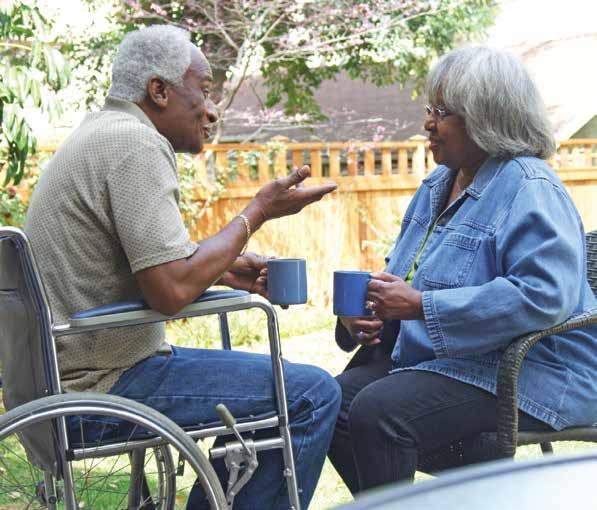
As we already know exercise is good for your body. But did you know it can also boost your mood, improve your sleep, and help you deal with depression, anxiety, stress, and more?
Exercise is not just about physically getting in shape. Yes, exercise can improve your physical health and even add years to your life. But regular exercise can have a profoundly positive impact on your wellness. It also relieves stress, improves memory, helps you sleep better, and boosts your over all mood. And you do not have to be a fitness fanatic to reap the benefits.
A body and mind in motion will give you an enormous sense of well-being. You will feel more energetic throughout the day, have sharper memories, and feel more relaxed and positive. Exercise is also powerful medicine for many common mental health challenges. Research indicates that modest amounts of exercise can make a real difference. No
matter your age or fitness level, you can learn to use exercise as a powerful tool to deal with mental health problems, improve your energy and outlook, and get more out of life.
SENIORcare: Prioritize Yourself: Staying active –“A Body and Mind in Motion, Stays in Motion” pro vides useful tips, information, and resources to help your body and mind stay active helping you maintain the highest quality of life for your situation. Make physical and mental exercise a fun part of your everyday life. You do not have to spend hours in a gym or force yourself into long, monotonous workouts to experience the many benefits of exercise. Remember “A Body and Mind in Motion, Stays in Motion.” Stay Positive! Stay Safe!
Hiram E. Jackson Publisher, Michigan Chronicle Chief Executive Officer, Real Times Media

CHOOSE YOUR OWN CAREGIVER.
You may qualify to receive care in your own home provided by your friends and family funded by the MI Choice program. Call us today for more information regarding eligibility.
This program is funded by the Michigan Department of Health and Human Services.
2 SENIORcare | October 2022
CALL 1(800) 815-1112 OR APPLY ONLINE AT THESENIORALLIANCE.ORG/WAIVER LIVE YOUR WAY
Why Long-Term Care Insurance Helps in the End
By Sherri Kolade
The national median cost of assisted living is $4,000 a month, or $48,000 a year. On average, a private room in a nursing home costs about $8,365 a month, or $100,380 a year.
Could you afford this today?
If covered, long term care insurance, which helps cov er extended medical expenses like nursing home stays, could.
Long Term Care Insurance, which greatly differs from health care, is important to have when (or if) that time comes and preparation is crucial for that journey.
Some people are surprised to learn that in addition to health insurance they need long-term care insurance, which is not mutually exclusive.
Given that Michigan’s population of senior citizens is expected to outpace its current group of children by 2025, the aging population is understandably concerned about affordable long-term care. Possible health issues may seem far away, but it’s never too early to start prepar ing, according to michigan.gov.
Long-term care is expensive, and for many people planning for it that far in advance is too soon. However, for those ready to grapple with this sometimes-difficult topic, there are numerous long-term care insurance op tions in Michigan starting with visiting the state’s website, michigan.gov, and searching “long-term care insurance.”
Independent insurance agents are experts in longterm care insurance and can help you find exactly what you need. But first, a briefing on long-term care insurance.
While it differs from life insurance (think life insurance for the living and not for beneficiaries) it is a policy de signed to help one prepare for the financial side of as sisted living services and other medical fees when they get older.
Long-term care insurance is very similar to a life in surance policy, the difference being that you’re the one who gets the benefit payout—to use while you’re still alive. Working with an experienced independent insurance agent is the best way to find a policy that’s set up in a way that benefits you as much as possible.
It is described as a “just in case” method of prepara tion. Setting money aside while you’re young and healthy can make a huge difference, according to the article.
Having to pay out of pocket for increased medical costs after retirement can be extremely stressful, espe cially if you haven’t planned for it in advance. Long-term care insurance aims to help make this phase of life easier for the elderly.
It begins with paying a regular premium. Long-term care insurance is often purchased by adults in their 40s who have watched their parents go through assisted liv ing or paying other excessive medical fees, and in turn, became inspired to start setting money aside for them selves to use later in life.
Benefits kick in once someone needs long-term care, or are diagnosed with an ailment that requires another form of long-term care, such as continuous treatment and doctor visits.

Depending on one’s specific policy, they may re ceive a certain amount of these benefits daily, weekly, or monthly.
What Does Michigan’s Long-Term Care Insurance Cover?
Pretty much all forms of long-term care may be neces sary in old age or following a particularly severe health di agnosis. Long-term care insurance is set up to help in the event that you outlive the money you’ve saved up or find that maintaining your self-care becomes more expensive in your advanced years.
You can use your benefit payout to help with all kinds
of medical costs. Below are some of the most common services and fees to apply coverage to.

Long-term care insurance benefits can help provide coverage for costs associated with the following:
■ Nursing homes
■ Assisted living facilities
■ Extended hospital stays
■ Recurring doctor visits
■ Multiple surgeries
■ Testing and diagnostic processes
■ Prescription medications
■ Physical therapy or other rehabilitation following surgery
■ Chemotherapy and radiation treatments
■ Fees associated with treating and recovering from long-term illnesses like stroke, dementia, or Alzheimer’s disease
Your insurance company may base your premium rates on the following factors:
■ Age
■ Race
■ Gender ■ Weight
■ Health history
■ Lifestyle habits (smoker vs. non-smoker, etc.)
■ Location of residence
As with other forms of life insurance and even health in surance, premiums tend to be on the pricier side for folks who are generally considered to be less healthy and lead riskier lifestyles. Although it depends on many things, in general, the younger and more fit and careful you are, the lower your premium is likely to be.
Several factors influence the cost of long-term care in surance, including where you live. The cost of treatment and service rates in your area also influences insurance premiums. Here’s a look at a few average costs for com mon long-term care services in Michigan.
Attorney Terrence G. Quinn, Michigan estate planning attorney at The TGQ Law Firm, told the Michigan Chroni cle that Long Term Care Insurance is an important propo nent to helping seniors in the long run.
Quinn, in his 40s who has this form of insurance, advo cates that it’s a good idea even in middle age to keep this on hand.
“My wife and I have policies combined – we pay $500 a month,” he said. “The more you age and the more your health changes and like any insurance the more expensive it will be. … I encourage all my clients and say once you reach your 40s you should at least get a quote and one of those things in my opinion is if you can afford it (get it.)”
Senior Care Attorney Terrence G. Quinn, Michigan estate planning attorney at The TGQ Law Firm

SENIORcare | October 2022 3
Seniors, Are Your Affairs in Order?
By Sherri Kolade
Things get expensive as you age.
This universal truth is undeniable as unexpected (and expected) prices with healthcare, insurance, medical bills, and other financial responsibilities creep up on senior citi zens who may already be spread thin with their money due to a limited income.
However, all hope is not lost. For seniors looking to boost their resources and eliminate financial confusion during their golden years – and be ready when the time comes –staying organized and intentional is key.

First Independence Bank notes that it is important to keep important documents in an easily accessible location and start establishing those documents now – if they’re not in existence already.
Meet with an attorney who is an expert in estate plan ning and at the minimum, consider a trust or will, power of attorney, and an advanced care directive (living will). It is advisable to have your affairs organized before the meeting to keep your expenses down.
Trust or Will
Trusts and Wills do the same thing, secure your assets, and ensure that your last wishes are followed. But which is right for you? According to Jehan Crump-Gibson, co-found er and managing partner of Great Lakes Legal Group, “Not
one size fits all. An estate planning attorney will work with you to decide which option will work best, with the ultimate goal of avoiding Probate Court.”
Your attorney will work with their client to ensure that you have an accurate accounting of all assets; that you have determined who you wish to bequeath money or property to; which, if any, charitable contributions you want to make; and how to best mitigate your estate taxes.
Should you die without either, then it can lead to a long, drawn-out time in Probate Court which could be both costly and time-consuming. “Your best option,” says Crump-Gib son “is to avoid Probate Court at all costs as it can be te dious, costly, and open to the public.”
Power of Attorney
A Power of Attorney is a legal document where you, the principal, give someone the power to act on your behalf, generally for financial decisions. A General Power of Attor ney is broad and generally gives your designated individual the power to make all financial decisions while you are alive and can make decisions and give advice. A General Power of Attorney ends when the principal dies.
Attorney Terrence G. Quinn, Michigan estate planning attorney at The TGQ Law Firm, told the Michigan Chronicle that the most important affair people need to get in order (at any age) but especially for seniors is the will and trust.
“That also includes power of attorney,” Quinn said, add
ing that the will includes powers of attorney, and the trust is designed to identify what happens to one’s assets. “These are two major questions everyone needs to deal with – what happens to your assets or children if you die or if you be come incapacitated? Who will make decisions when you die?”
Quinn added that if people are OK with their family going to probate court to settle the issue, then they “don’t have to do anything” about these documents.
“Almost everyone I talk to is concerned about probate court,” he said.
Advanced Care Directives
As with Powers of Attorney, there are numerous versions of Advanced Care Directives. The oldest one is a Living Will. It is a legal document that allows you to specifically state your wishes as to your health care at the end of your life. Often, people opt for the administration of “palliative” care (be made comfortable) while avoiding “extraordinary” mea sures such as CPR or ventilators.
Be Organized
Let your executor or another trusted person know where all your documents are. Consider renting a safe deposit box so that they will all be in one place or leave them in the hands of your attorney.
In addition to being organized, Bluebird Home Care encourages adult children to monitor their parent’s med ication use by ensuring that they are taking proper pre scriptions, getting the right dosage, and avoiding having negative reactions.
According to Bluebird, to do this, adult children can:
■ Create a list of all their medications and what they’re tak ing them for
■ Make sure their doctors and pharmacy have the list
■ Always review all the medications they are taking with their doctor anytime a new drug is prescribed
■ Update the list any time their medications change
Financial expert Dave Ramsey recommends seniors keep all important information in a “legacy drawer,” which stores all official documents.
“Carrying out your final wishes should be easy for your loved ones when the time comes. And it will be—as long as they can find everything, they need in one place,” the article noted. “Wouldn’t that be nicer than frantically searching for random scraps of paper? Creating your legacy drawer is one of the most gracious gestures you’ll ever make for your family.”
Ramsey added that having difficult conversations about end-of-life wishes can be made all the easier with the draw er added in the discussion.
While “drawer” is in the name, the legacy drawer could very well be online and digital. The drawer should include everything relating to one’s financial life, their medical wish es, insurance policies, funeral plans, and passwords.
A safe deposit box should also be added for storing orig inal documents.
Senior Care Attorney Terrence G. Quinn, Michigan estate planning attorney at The TGQ Law Firm

4 SENIORcare | October 2022
TURNING
OR NEW TO
Medicare information and enrollment—I can help

Let’s discuss Medicare Advantage and how it fits into your life
If you’re new to Medicare, I can help you make sense of it.
Or maybe you have Medicare now and you’re looking for a new plan—or a new premium. Maybe you want to add coverage, such as a prescription drug plan or a Humana Medicare Supplement Insurance Plan. I’ll listen to you and put information together.
We’ll find the right plan for you
Then we can discuss how that information may become real in a Humana Medicare Advantage plan that fits your needs. One with everything Original Medicare has—and that may have benefits you might not get with Medicare Part A and Part B. Let’s talk. Whatever you’d like to know about Medicare, whatever choices you make about it, I can help.
Call a licensed Humana sales agent

Danielak
(TTY: 711)
– Friday, 8 a.m. – 5 p.m.
A more human way to healthcare™
At Humana, it is important you are treated fairly. Humana Inc. and its subsidiaries comply with applicable Federal Civil Rights laws and do not discriminate on the basis of race, color, national origin, age,
SENIORcare | October 2022 5
Timothy
586‑703‑2013
Monday
tdanielak@humana.com Humana.com/tdanielak Y0040_GHHHXDHEN22_AD_C ARE YOU
65
MEDICARE?
disability, sex, sexual orientation, gender, gender identity, ancestry, marital status or religion. English: ATTENTION: If you do not speak English, language assistance services, free of charge, are available to you. Call 1 877 320 1235 (TTY: 711). Español (Spanish): ATENCIÓN: Si habla español, tiene a su disposición servicios gratuitos de asistencia lingüística. Llame al 1‑877‑320 ‑1235 (TTY: 711). 繁體中文 (Chinese): 注意:如果您使用繁體中文 ,您可以免費獲得 語言援助服務 。請致電 1‑877‑320 ‑1235 (TTY:711) 。
Caregivers will find support and resources at the Alzheimer’s Association
When a person is diagnosed with Alzheimer’s life changes very quickly for all involved. The role of caregiver can be an overwhelming task. According to the 2022 Alzheimer’s Disease Facts and Figures Report, family members, friends, or other unpaid caregivers make up 83% of the help that is given to older adults in the United States. More than 11 million Americans provide unpaid care for people with Alzheimer’s or other dementias, which is 48% of all caregivers.
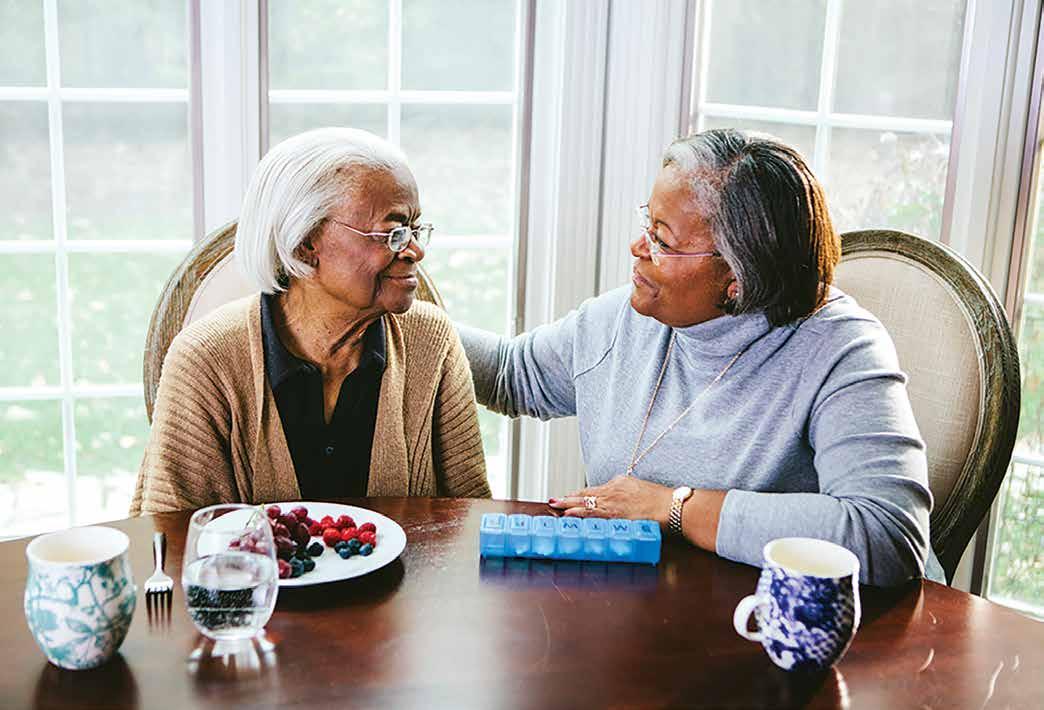
6 SENIORcare | October 2022
As people go through the journey of caregiving, it can be isolating and emotional. Depending on the family structure of the patient and caregiver, some people may feel hesitant, guilty, or embarrassed to ask for help or even talk about their experience as a caregiver.

“It is crucial that caregivers receive assistance, resources, and support,” said Jennifer Lepard, president and CEO of the Alzheimer’s Association Michigan Chapter. “Caring for a loved one with Alzheimer’s or dementia can be an overwhelming responsibility. It is important they know that they are not alone. The Alzheimer’s Association is there for caregivers with free educational programs, support groups and other resources.”
Some of the programs that the Association provides for caregivers include:

• Virtual or in-person support groups across the state.
• Educational programs that provide information on what to expect as a caregiver during each stage of Alzheimer’s,
communication strategies, behavioral changes, financial and legal information and more.
• Consultations with counselors to create a care plan and discuss common concerns like wandering, safety, communication issues and driving.
• Social engagement activities for those in the early stages of the disease and their caregiver, including museum tours, classes, and concerts.
Along with educational and social support, there is also financial support available. The Association offers respite care scholarships, providing financial assistance for those in need of caregiving assistance.
“We are a phone call or email away,” said Lepard. “Please don’t hesitate, we are here to help and support you.”
To learn more about all of the programs and resources the Alzheimer’s Association offers, visit www.alz.org/gmc or reach out to our helpline at helplinegmc@alz. org or 800.292.4900.
SENIORcare | October 2022 7
Keeping your brain sharp and in shape is just as vital as physical health. Taking time for daily brain exercises is essential, especially as we age. The key is to choose challenging (but not too frustrating) activities—assess your current level across various catego ries before you begin new exercises.

In general, brain games focus on one (or more) of these six areas:
• Long-term memory
• Working memory
• Executive functioning
• Attention to detail
• Multitasking
• Processing speed
And while you’re exercising these key areas, make sure to choose something you enjoy playing—these games can be useful and fun.
Online Memory Card Games
Sometimes the simplest games are the best for maintaining mental agility. Just like the memory games that children play with rows of cards, these online versions focus on different kinds of images that often cause confusion as our brains age. You can play versions with photographs of real people to help with facial recall or black and white pictures to improve pat tern recognition. The sites frequently add new sets of cards, so keep this site book marked for easy access.
Free Online Variety Sites
Many websites offer free games for se niors in a variety of areas—everything from verbal skills to logic and math is at
Exercise your brain: 10+ games to stay sharp
your fingertips! BrainCurls is completely free and easy to access from a computer or tablet; no app download is necessary. The site features different games every month and often adds new material to popular categories, including “current vocabulary,” so you can keep up with the times. BrainTrainer is another site that of fers a wide variety of games with a rotat ing daily challenge. Start a free account to keep track of your progress in various areas.
Online Visual and Logic Games
Strengthening your visual acuity doesn’t have to involve specific memory recall games. Activities like jigsaw puzzles and Tetris are an excellent way to exercise the connection between visual inputs and brain processing. These sites are free to play and offer various difficulty levels so you can challenge yourself without feel ing frustrated. If you’d rather exercise the logical side of your brain (but in a visual rather than mathematical or text-based format), try sites that offer online chess, checkers, or solitaire. These classic games help you practice planning and thinking multiple steps ahead. These sites also let you play against friends or a computer and offer training sessions.
Online Word Games
Do you enjoy word games? Exercise many of the same brain muscles (visual input, memory, logic, etc.) with games focused on vocabulary, trivia, and clever puns. Try a daily crossword site to keep your vocabulary and trivia knowledge sharp. If you’d like general trivia without the crossword component, this site of
fers new questions frequently in various categories!
Apps for Personalized Exercises
If you’d like a program that offers a wide variety of gamesome—all at your level for maximum effectiveness—try one of these apps. You’ll have to pay a fee to access most of the services, like progress track ers, but the small price can be worth the customized content! Lumosity and Ele vate are the most popular apps for good reason; they’re both easy to use and offer consistently high-quality activities.
Hard Copy Puzzle Books
Sometimes it’s nice to actually hold a book, right? For some seniors who want to improve their mental agility, holding a physical pencil to work through problems

can be an obstacle. Still, others can find increased effectiveness when the kines thetic component of learning is included. For one of the best variety puzzle books, try this book of 399+ games that target key areas. Books that focus on specific games, like sudoku or crosswords, are also excellent options and available in most stores.
Try incorporating several of these brain games into your daily routine. You’ll no tice the difference in mental agility quick ly! The Active Aging Series is brought to you by our partner, Cambrian Homecare. Cambrian Homecare has been assisting individuals to stay independent in their homes for 25 years. Flexible experience you can trust, when the best place is still at home.
8 SENIORcare | October 2022
How Families Can Work Together to Care for Older Loved Ones
One of my mother’s favorite sayings still rings in my ears, “Many hands make light work.” Mom used it to get our family to work together on holiday preparations, Saturday housecleaning, and nightly dinner dishes. When Mom’s dementia progressed and her care needs increased, my sister and I were guided by her advice, but my brother…not so much! He was more of a spectator than an integral part of Mom’s caregiving team. It caused hard feelings that linger, years later. But our sisterly cooperation has created a deep bond and memories we’ll always cher ish. How about you and your family? Are family caregiving challenges demanding more than one person can manage? Would you like to tap into your family’s resources and strength? Try some of these team-build ing strategies. You may not be able to re cruit everyone, but you’ll be forever grateful to whoever joins your caregiving team.
The Resilience-Building Power of Family Teamwork
Dr. Froma Walsh, an authority on family resilience, tells us that resilience is the abili ty to withstand and rebound from disruptive life challenges. Individuals who are resilient adapt to life’s demands by positively mar shaling their beliefs, behaviors, and resourc
es. Resilience is a vital source of strength, stamina, and growth for caregiving families. Check-out my two previous posts to learn about family resilience factors, how to mar shal your family’s resources, and how to help your family find the benefit embedded in stressful caregiving situations. Dr. Walsh teaches that families who are resilient handle adversity together, as a team. And throughout history, many otherwise people have understood the power of teamwork.
In the best of circumstances, it’s difficult to create teamwork, but it can seem impos sible when someone you love is desperately ill or dying, and you must go to work, raise children, and run a household at the same time! But times of caregiving are when you need family collaboration the most. If you and your family need to work together on family caregiving, here are four strategies that could help.
Build Family Resilience by Working as a Team
1. Set up an efficient, easy-to-use communication system
Teams that are successful communicate well. Caregiving families need to work to gether, but many members live far apart,
making in-person gatherings difficult or im possible. Phone calls are good, but when you want to reach many people at once, go ing online can save time and energy. One way to simplify communication is to use a site like Lotsa Helping Hands. It provides a free, secure group calendar for organizing helpers to provide meals, rides, and oth er necessary tasks. It includes message boards for keeping a caregiver’s network in formed, and for sharing words of support or photos. Check-out this 30-second descrip tion or a 5-minute introduction.
2. Reach out to others when you need help
Like any team sport, family caregiving is not meant to be done alone. It’s too big a job for one person. Though asking others to lend a hand may be uncomfortable for you, it’s the best thing to do when you need help. Use this four-step process to tap your team’s resources and give others the op portunity to contribute:

• Figure out what kind of help is needed
• Ask for it: clearly, directly, and respectfully
• Gratefully accept what others offer
• Find outside helpers if you can
3. Hold family meetings.
Discussing medical, financial, and per sonal issues is an important way to ease the family caregiving journey. Unfortunately, family dynamics can make these conversa tions difficult. Siblings who need to be “the boss” or “the expert;” a parent’s preference for “keeping the peace” or avoiding taboo topics; and a partner’s tendency to be ar gumentative or pessimistic are just a few things that can derail conversations and destroy family teamwork. For guidance on how to call and run family meetings, check out this link: http://www.agingcare.com/ Articles/holding-family-meetings-for-ag ing-parents-142664.htm
4. Become a Share the Caregroup.
The range of tasks and responsibilities caregivers handle is often overwhelming. Simply asking for help may not be enough. There is a way to build a powerful care giving team that shares the challenges of family caregiving. It’s called Share the Care. Share the Care is a practical model for creating and maintaining caregiving groups over time. Back in the 1990’s Shei la Warnock and Cappy Capossela formed a “family” group with ten other people to help their terminally ill friend, Susan. Not blood relatives, they called themselves “Susan’s Funny Family” and stayed togeth er caring for her for three and a half years. After Susan’s death, the group realized the profound impact of their experience. The family caregiving system that guided them led to Share the Care, a book, and now a non-profit business that teaches families, friends, and faith communities all over the world how to successfully replicate their blueprint for providing care as a group. Find information on how to form and main tain a Share the Care group visit: http:// sharethecare.org and http://www.amazon. com/Share-Care-Organize-Someone-Se riously/dp/0743262689/ref=sr_1_1?s= books&ie=UTF8&qid=1432829778&s r=1-1&keywords=share+the+care
Team Building Strategies for Resilient Caregivers
Joining with others in a positive way is critical, but it can also be difficult to do. Physical distance, busy schedules, and family history; fatigue, anxiety, and anger are just a few things that block caregivers from connecting with others. Don’t let barri ers like these keep you from receiving resil ience-building support.
Use these family team-building strate gies to boost your resilience and preserve your capacity to care. Whatever you do to connect with others will be good for you, your family, and those in your care. As you do so much for others, remember to take good care of yourself, too.
SENIORcare | October 2022 9
Prioritize Yourself This Season with These Self-Care Tips
Self-care
means focusing on your health and wellbe ing. This includes practicing good hygiene, eating healthy and nutritious meals, participating in phys ical activity, seeking professional help, and more. In need of a self-care routine of your own? Here are six simple ways to take better care of yourself this season.
GET SOCIAL
Research has linked social isolation and loneliness to higher risks for several mental and physical conditions, in cluding depression, anxiety, cognitive decline, high blood pressure, obesity, heart disease, and in some cases, death. Fortunately, there are many ways to connect with others and combat loneliness.
Here are a few examples of things you can do to cope with loneliness:
Smile. According to University of California researchers, smiling more may help to combat loneliness. What’s more? Smiling more, even in the mirror, can help you feel calm and centered.
Adopt a pet. Studies show that pet owners are less likely to suffer from depression when compared to people without pets. Pets also help to decrease anxiety and stress while increasing serotonin, dopamine, and oxytocin lev els—all of which help keep you happy, calm, and relaxed.
Call up a friend. According to the Centers for Disease Control and Prevention (CDC), talking to friends, loved ones, and neighbors about your feelings and concerns can relieve stress. If you’re unable to call a friend or loved one, there are several support lines you can contact, including the Institute on Aging Friendship Line (1-800-971-0016) and the Samaritans Helpline (1-877-870-4673).
CONSIDER JOURNALING
Believe it or not, journaling is one of the best ways to re lieve stress and process your emotions. According to one 2018 research review, writing about your inner thoughts and feelings may also help lower your blood pressure and boost your mood. Additionally, journaling can help improve your memory and strengthen your immune system!
EAT MINDFULLY
Mindful eating is a mindfulness exercise in which you slow down and pay full attention to the food ou’re putting into your body. In addition to aiding digestion, mindful eat ing encourages you to focus on how food makes you feel, which often leads to healthier and more nutritious food choices.
EXERCISE DAILY
Exercising regularly can help you both mentally and physically. Exercise has the power to improve your mood, reduce stress and anxiety, and reduce the risk of disease, among other benefits. According to the CDC, getting at least 150 minutes of moderate physical activity per week can lower your risk of heart disease and stroke—two lead ing causes of death in the U.S.
Can’t get to the gym? Here are a few ways to incorporate physical activity into your daily routine:
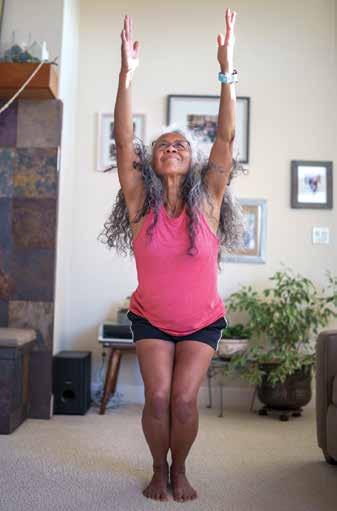
Take the stairs. Walking up the stairs instead of using the elevator is one way to add a bit of cardio to your day. Plus, it’ll save you a bit of time!
Go for a walk. According to the Mayo Clinic, walking can help strengthen your immune system, prevent or manage certain conditions, including high blood pressure and type 2 diabetes, and increase your energy levels.
Clean your home. Did you know you can get a full-body workout by cleaning your home? In fact, you can burn up to 129 calories by washing the dishes!
MAKE SLEEP A PRIORITY
Chronic sleep deprivation can lead to severe and longterm health problems, including diabetes, high blood pres sure, heart failure, or stroke. Poor sleeping habits can also cause low libido, depression, and reduced immune system function. According to the American Academy of Sleep Medicine and the Sleep Research Society (AASM), adults between 18 and 60 years old should get at least seven hours of sleep each night.
TRY YOGA
Yoga offers numerous mental and physical benefits, in cluding a healthier heart, improved mobility and flexibility, and increased blood flow. Additionally, yoga may be able to reduce inflammation—which is the catalyst for many con ditions, including Chron’s disease, diabetes, and endome triosis. According to one study conducted by researchers at Ohio State University, individuals who routinely practice yoga have lower amounts of interleukin-6 or IL-6, a cytokine that causes inflammation, in their blood.
Remember, there are infinite ways in which you can practice self-care. The above ideas are just a starting point.
AARP Michigan Presents a “First Look” Conversation with Gubernatorial Candidates Tudor Dixon and Gretchen Whitmer

As part of AARP’s She’s the Difference voter engage ment campaign celebrating the power of women voters, AARP Michigan is offering a first look at the republican and democratic contenders for the state’s highest elect ed office.
In a conversation featured on our website at aarp. org/MIVotes, gubernatorial candidates Tudor Dixon and incumbent Gretchen Whitmer share their thoughts and plans on issues identified most important to Michigan voters in a recent AARP poll, including those specifically important to the more than 5 million women in the state. Those issues include inflation and rising prices, the cost of prescription drugs, election security and voting rights, and long-term care.
“Our goal is to inform and educate AARP members and their families where candidates stand on important issues and provide an opportunity to hear directly from the candidates, unfiltered by the media or any other organization,” said AARP Michigan State Director Paula D. Cunningham. “We know voters over the age of 50 are the most reliable and powerful voting bloc in the country and that an informed electorate is better equipped to choose a candidate that best fits their views and values. This ‘first look’ conversation provides that opportunity.”
AARP’s conversation with the gubernatorial candi dates is available at aarp.org/MIVotes. Visitors to the site also have access to AARP’s Voter Resource Guide con taining the most up-to-date election information, includ ing how to register to vote, where to vote in person, the rules for absentee voting and all key voting deadlines. Michigan’s General Election is on Tuesday, November 8.
AARP is a nonpartisan, nonprofit organization and a trusted source for news and information. With approxi mately 1.3 million members in Michigan, AARP works to strengthen communities and advocate for what matters most to people age 50+ and their families.
About AARP
AARP is the nation’s largest nonprofit, nonpartisan organization dedicated to empowering people 50 and older to choose how they live as they age. With a nationwide presence and nearly 38 million members, AARP strengthens communities and advocates for what matters most to families: health security, financial stability and personal fulfillment. AARP also produces the nation’s largest circulation publications: AARP The Magazine and AARP Bulletin. To learn more, visit www. aarp.org, www.aarp.org/espanol or follow @AARP, @AARPenEspanol and @AARPadvocates, @AliadosAdelante on social media.
10 SENIORcare | October 2022

SENIORcare | October 2022 11 Ascension Complete is a Medicare Advantage Plan made by doctors you trust, so you get the coverage you need. Check out the benefits we offer. Get to know Ascension Complete Y0020_CNC_90828E_M FINAL1 CMS Accepted 09172022 Benefits vary by plan. Get the Medicare Advantage coverage you deserve. Call Ascension Complete today to enroll. Ascension Complete is contracted with Medicare for HMO and PPO plans. Our D-SNP plans have a contract with the state Medicaid program. Enrollment in Ascension Complete depends on contract renewal. October December 15 7 Don’t miss out. Annual Enrollment Period: 1-877-841-6287 (TTY: 711) 7 days a week, 8 a.m. - 8 p.m. medicare.ascensioncomplete.com ✓ $0 plan premiums ✓ $0 primary care physician visit copay ✓ Telehealth appointments ✓ Prescription drug coverage ✓ More money back in your Social Security check every year ✓ Dental services with no annual maximum, including exams, fillings, extractions, implants, and dentures ($0 copay for preventive services, 30% cost share for comprehensive services) ✓ Preloaded Visa Flex Card to help pay for dental, vision, and hearing benefits not covered by the plan ✓ Vision and hearing coverage ✓ Spiritual Care - Connect virtually with a professionally trained chaplain for your spiritual and emotional needs, anytime, from anywhere ✓ Fitness membership at no additional cost J169798_33_MICH_10_10.5_AS23ENEASC90828HP.indd 1 10/10/2022 11:54:44 AM

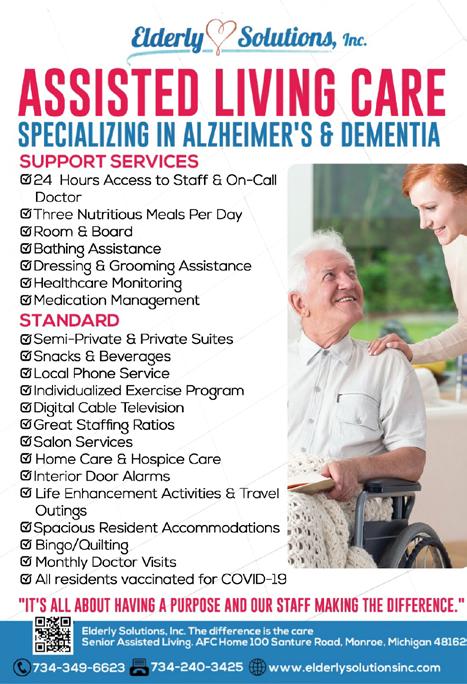

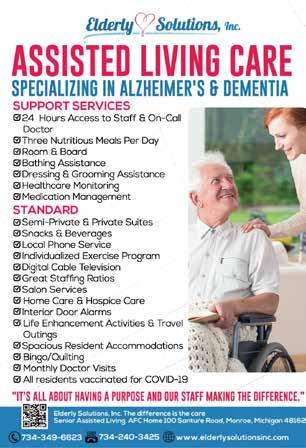
12 SENIORcare | October 2022
“IT’S ALL ABOUT HAVING A PURPOSE AND OUR STAFF MAKING THE DIFFERENCE.”
























